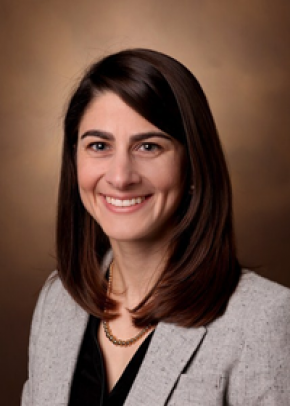Age-Friendly Health Systems, an initiative of the Institute for Healthcare Improvement and The John A. Hartford Foundation, aims to ensure that all older adults receive high-quality, evidence-based care to minimize preventable harm. The initiative emphasizes that older adults face the greatest risk of preventable harms from their health care experience.
“For older adults, who make up a third of hospitalized patients, the hospital system itself can actually harm them,” said Maria Duggan, M.D., clinical director of geriatric operations at Vanderbilt University Hospital. “Integrating age-friendly principles into hospital systems is incredibly important.”
Duggan and a team of nearly 40 interdisciplinary colleagues, including Sarah Welch, D.O., an instructor in the Department of Physical Medicine and Rehabilitation at Vanderbilt, have been implementing age-friendly initiatives on the Acute Care for Elders (ACE) unit at Vanderbilt since 2019. They are gearing up to expand the initiative throughout the health system.
The 4Ms Framework
At the core of the Age-Friendly Health Systems initiative is the implementation of four evidence-based elements of high-quality care – the “4Ms” – that include What Matters, Medication, Mentation, and Mobility. These elements serve as a framework for focusing on an older adult’s overall wellness as opposed to solely their disease.
“When our team of clinicians, nurses, case managers, social workers, pharmacists and therapists center care on the 4Ms, it helps ensure we are aligned with the patient’s goals and doing everything we can to avoid preventable harm,” Duggan said.
Take mobility, for example. Research shows that older adults value independence and function as their highest priorities. With the implementation of the 4Ms Framework, frontline nurses on the ACE unit not only document mobility achieved but also work with patients to set realistic mobility goals that align with what matters to them.
“Now we partner with [patients] to shape their mobility goals over the course of time they are admitted to the hospital.”
“A patient might say that they want to be able to interact with their grandkids or attend their grandson’s wedding – that’s what matters most to them. Now we partner with them to shape their mobility goals over the course of time they are admitted to the hospital,” Welch said.
Initial Success
With all 4Ms now being implemented on the ACE unit, Welch and colleagues are working to streamline the process. Key to the initiative’s success is engaging stakeholders, says Welch.
“The people who are actually executing the work need to be invested, and we meet monthly,” Welch said. All protocols to assess and act on the 4Ms have been co-developed with nurses and interdisciplinary team members alongside patients and family advocates.
“Christina Mathis, the ACE Unit’s day shift clinical staff leader, has done a fantastic job involving frontline nursing staff from the beginning of this journey,” Duggan said.
Expanding 4Ms Across the System
The team is looking at the larger Vanderbilt health system for opportunities to apply the 4Ms framework. “Each unit will be different. We are going to need to identify facilitators and barriers throughout the system,” Welch said.
“Each unit will be different. We are going to need to identify facilitators and barriers throughout the system.”
To support this expansion, Duggan, Welch and colleagues were recently awarded a grant from the West End Home Foundation. “This grant will provide support for a program manager and will allow us to reach older adults beyond our ACE Unit,” Duggan said.
The team also plans to assess how implementation of the 4Ms impacts health outcomes like 30-day readmissions, length of stay, institutionalization, functional outcomes, and quality of life.
“Each of these Ms is evidence-based on its own, but no one has said, ‘What happens when we bundle all four of them together? What kind of impact are we going to have?’” Welch said. “I’m really passionate about bringing [these] evidence-based practices to older adults.”





